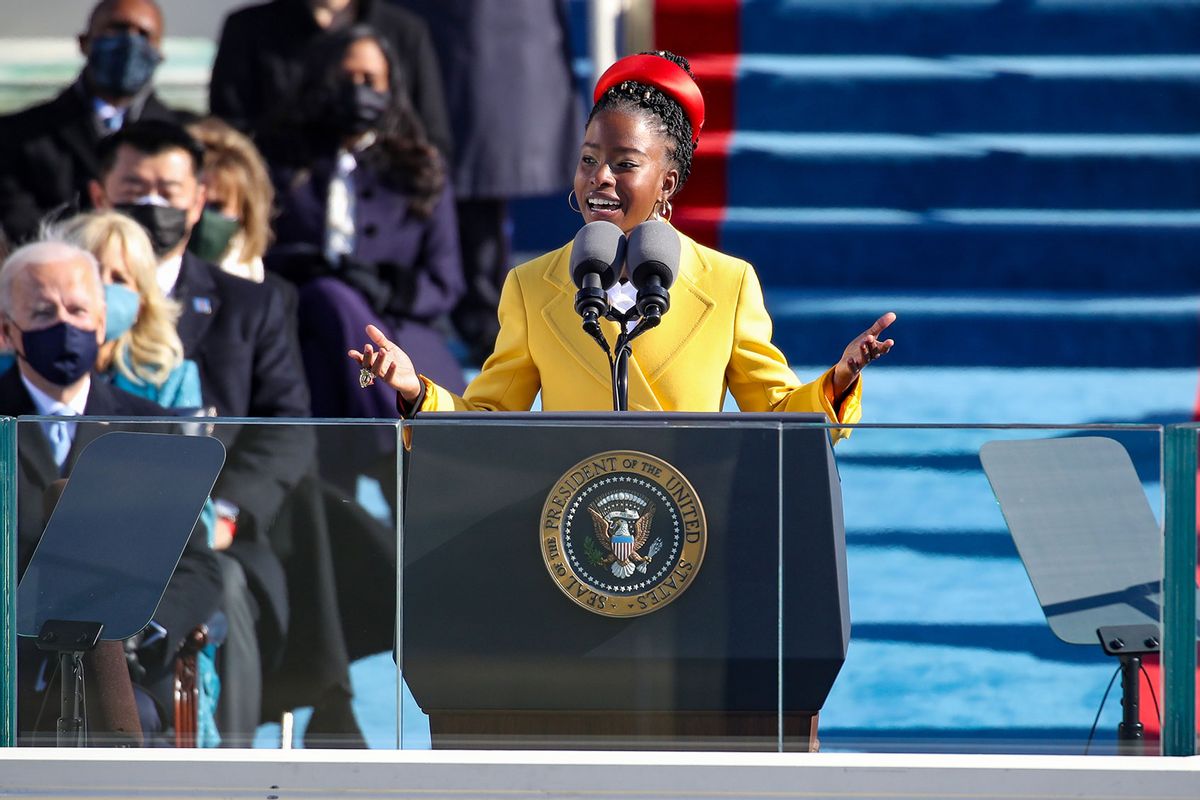The poem written for President Joe Biden's inauguration by Amanda Gorman was removed from the elementary school section of a Florida public school in Miami-Dade County due to one parent's complaint.
CNN reported that a parent of a student at Miami Lake's Bob Graham Education Center opposed the poem, "The Hill We Climb," and incorrectly cited Oprah Winfrey as its author/publlisher, according to documents obtained by the Florida Freedom to Read Project.
The poem "is not educational and have (sic) indirectly hate messages," the parent said in the complaint, adding that it would "cause confusion and indoctrinate students."
Additional complaints the FFTRP obtained also showed the same parent objecting to a poetry-based biography of Black poet Langston Hughes called "Love to Langston," "The ABCs of Black History" and two books about Cuba.
The K-8 school's materials-review panel declined to entirely remove Gorman's poem from the library. However, it did opt to relocate it and two other contested items to the middle school section, allowing older children access to the text, minutes from the school's April meeting obtained by the FFTRP show.
Gorman, the nation's first youth poet laureate, admonished the school's decision and the nationwide rise of campaigns to ban literature in schools in a statement shared to Instagram and Twitter Tuesday evening.
"I'm gutted. Because of one parent's complaint, my inaugural poem, The Hill We Climb, has been banned from an elementary school in Miami-Dade County, Florida," the statement began.
"I wrote The Hill We Climb so that all young people could see themselves in a historical moment," Gorman wrote, adding, "Robbing children of the chance to find their voices in literature is a violation of their right to free thought and free speech."
In a separate tweet, Gorman criticized the parent who voiced the opposition, posting an image of the complaint document to the platform.
"So they ban my book from young readers, confuse me with @oprah, fail to specify what parts of my poetry they object to, refuse to read any reviews, and offer no alternatives…Unnecessary #bookbans like these are on the rise, and we must fight back," she said, calling others to donate to an Instagram fundraiser.
Miami-Dade County Public Schools spokesperson Elmo Lugo told CNN in a Tuesday evening statement that "No literature (books or poem) has been banned or removed."
"It was determined at the school that 'The Hill We Climb' is better suited for middle school students and, it was shelved in the middle school section of the media center. The book remains available in the media center," he said.
Though Gorman's poem was not banned from the school, book bans targeting "queer and non-white voices" are on the rise in the country, as the poet described in her statement.
According to American Library Association data, LGBTQ books were the subject of less than 1 to 3 percent of book challenges filed in schools from the 2000s to the early 2010s. That number surged by 16 percent in 2018, 20 percent in 2020 and 45.5 percent by 2022.
In a Tuesday report, The Washington Post analyzed the ALA data alongside all the book challenges filed in the 2021-22 school year with the 153 districts a researcher with advocacy group PEN America identified as receiving formal book complaints last year. Officials in more than 100 school systems spread across the nation provided 1,065 complaints amounting to 2,506 pages.
The analysis found that 43 percent of the filings targeted texts with LGBTQ characters or themes while 36 percent challenged books dealing with race and racism or featuring characters of color.
Want a daily wrap-up of all the news and commentary Salon has to offer? Subscribe to our morning newsletter, Crash Course.
The primary reason filers cited for challenging LGBTQ books was "sexual content" followed by the second most-common "explicit desire to prevent children from reading about lesbian, gay, bisexual, transgender, nonbinary and queer lives," The Post said, with 61 percent and 18 percent of challengers listing these concerns, respectively.
"The theme or purpose of this book is to confuse our children and get them to question whether they are a boy or a girl," a North Carolina filer reportedly wrote of "Call Me Max," which revolves around a transgender boy.
The Post also discovered that the majority of the over 1,000 complaints were filed by just 11 people, who each brought 10 or more challenges in their school district. These serial challengers were responsible for 60 percent of all filings but comprised only 6 percent of all objectors.
In some cases, these challengers also galvanized a network of volunteers through conservative parent groups like Moms for Liberty.
Though there is little data on the effects of LGBTQ texts on children because of the recency with which LGBTQ books have become widely available, Amy Egbert, a University of Connecticut assistant professor who studies youth mental health, told The Post, "we do have a lot of data about other topics that doesn't lead us to think that reading a book would make a child suddenly become gay."
"Any time a certain identity is stigmatized, that tends to lead to more discrimination, more bullying, increased mental health challenges," Egbert added of the risk in banning queer literature. "Everything we know suggests this is very harmful to LGBTQ kids."



Shares